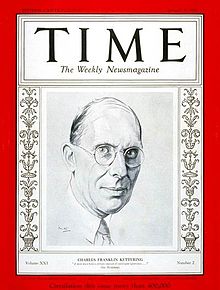Charles F. Kettering
| Charles F. Kettering | |
|---|---|

Charles Kettering, on a Time cover, 1933
|
|
| Born |
Charles Franklin Kettering August 29, 1876 Loudonville, Ohio |
| Died | November 25, 1958 (aged 82) Dayton, Ohio |
| Nationality | United States |
| Education | Ohio State University |
| Spouse(s) | Olive Williams |
| Children | Eugene Kettering |
| Parent(s) | Jacob and Martha Kettering |
| Awards |
Franklin Medal (1936) Hoover Medal (1955) IEEE Edison Medal (1958) |
Charles Franklin Kettering (August 29, 1876 – November 24 or 25, 1958) was an American inventor, engineer, businessman, and the holder of 186 patents. He was a founder of Delco, and was head of research at General Motors from 1920 to 1947. Among his most widely used automotive developments were the electrical starting motor and leaded gasoline. In association with the DuPont Chemical Company, he was also responsible for the invention of Freon refrigerant for refrigeration and air conditioning systems. At DuPont he also was responsible for the development of Duco lacquers and enamels, the first practical colored paints for mass-produced automobiles. While working with the Dayton-Wright Company he developed the "Bug" aerial torpedo, considered the world's first aerial missile. He led the advancement of practical, lightweight two-stroke diesel engines, revolutionizing the locomotive and heavy equipment industries. In 1927, he founded the Kettering Foundation, a non-partisan research foundation. He was on the cover of Time Magazine on January 9, 1933.
Charles was born in Loudonville, Ohio, United States, the fourth of five children of Jacob Kettering and Martha Hunter Kettering. Poor eyesight gave him headaches in school. After graduation he followed his sister Emma into a teaching position at Bunker Hill School. By all accounts he was an engaging and innovative teacher. He attracted students to evening scientific demonstrations on electricity, heat, magnetism, and gravity.
He took classes at The College of Wooster, before transferring to The Ohio State University. He was a member of the Delta Upsilon Fraternity. Eye problems forced him to withdraw, and he took a job as foreman of a telephone line crew. At first, the termination of his studies caused him to be depressed. Then he found ways to apply his electrical engineering skills on the job, and his spirits revived. He also met his future wife, Olive Williams. When his eye condition improved, he was able to return to his studies and graduated from OSU in 1904 with an electrical engineering degree.
...
Wikipedia
